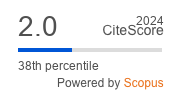The sensitivity of male rat reproductive organs to monosodium glutamate
DOI:
https://doi.org/10.5644/ama2006-124.94Keywords:
Monosodium L- glutamate (MSG), Testis, Testosterone, Sperm acrosome reactionAbstract
Objective. This study aimed to investigate the sensitivity of the testis, epididymis, seminal vesicle, and sperm acrosome reaction (AR) to monosodium L- glutamate (MSG) in rats. Materials and methods. Rats were divided into four groups and fed with non-acidic MSG at 0.25, 3 or 6 g/kg body weight for 30 days or without MSG. The morphological changes in the reproductive organs were studied. The plasma testosterone level, epididymal sperm concentration, and sperm AR status were assayed. Results. Compared to the control, no significant changes were discerned in the morphology and weight of the testes, or the histological structures of epididymis, vas deferens and seminal vesicle. In contrast, significant decreases were detected in the weight of the epididymis, testosterone levels, and sperm concentration of rats treated with 6 g/kg body weight of MSG. The weight loss was evident in the seminal vesicle in MSG-administered rats. Moreover, rats treated with MSG 3 and 6 g/kg exhibited partial testicular damage, characterized by sloughing of spermatogenic cells into the seminiferous tubular lumen, and their plasma testosterone levels were significantly decreased. In the 6 g/kg MSG group, the sperm concentration was significantly decreased compared with the control or two lower dose MSG groups. In AR assays, there was no statistically signifiant difference between MSG-rats and normal rats. Conclusion. Testicular morphological changes, testosterone level, and sperm concentration were sensitive to high doses of MSG while the rate of AR was not affected. Terefore, the consumption of high dose MSG must be avoided because it may cause partial infertility in male.Downloads
Published
11.05.2014
Issue
Section
Original Article
How to Cite
The sensitivity of male rat reproductive organs to monosodium glutamate. (2014). Acta Medica Academica, 43(1). https://doi.org/10.5644/ama2006-124.94





